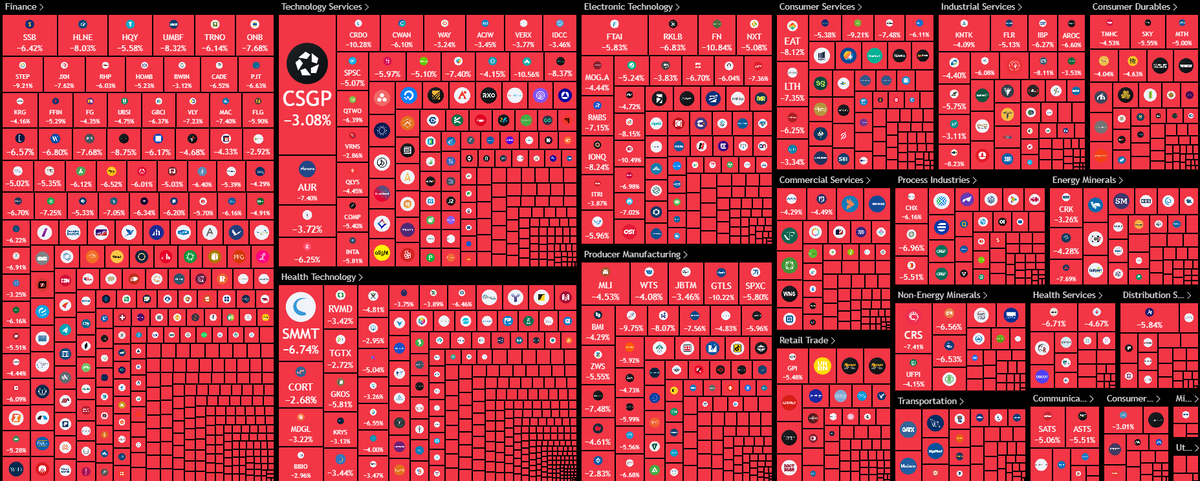
Russell 2000 Index Enters Bear Market: An Analysis
In a recent announcement, the Russell 2000 Index has officially entered bear market territory for the first time since 2022, marking a significant shift in the financial landscape. This development is particularly concerning for small-cap stocks, which have been severely impacted by ongoing trade wars and economic uncertainties.
Understanding the Russell 2000 Index
The Russell 2000 Index is a key benchmark that tracks the performance of the 2,000 smallest stocks in the Russell 3000 Index, which encompasses a broader range of U.S. companies. Investors closely monitor the Russell 2000 because it is often viewed as an indicator of the economic health of small-cap businesses, which tend to be more sensitive to domestic economic conditions than their larger counterparts.
The Current Market Climate
As of April 3, 2025, the Russell 2000 has officially entered bear market territory, highlighting a downward trend of 20% or more from its recent highs. The bear market status serves as a warning sign to investors, indicating that the sentiment surrounding small-cap stocks is currently negative. This shift has been attributed to various factors, including inflation pressures, rising interest rates, and the impacts of ongoing trade tensions that have escalated in recent months.
The Impact of Trade Wars on Small Caps
The trade wars, particularly between the United States and other major economies, have created a challenging environment for small-cap companies. Many of these businesses rely heavily on domestic markets and have limited exposure to international trade. However, the ripple effects of tariffs and trade restrictions can lead to increased costs for raw materials and disrupt supply chains, ultimately affecting profitability.
- YOU MAY ALSO LIKE TO WATCH THIS TRENDING STORY ON YOUTUBE. Waverly Hills Hospital's Horror Story: The Most Haunted Room 502
In contrast, larger corporations often have the resources to absorb such shocks or hedge against them through diversified operations. As a result, small-cap stocks are often more vulnerable during periods of economic uncertainty, contributing to the current bear market in the Russell 2000 index.
Investor Sentiment and Market Reactions
Investor sentiment plays a crucial role in market performance, and the entry of the Russell 2000 into bear market territory has been met with apprehension. Analysts and market watchers are closely observing the situation, as many small-cap stocks have seen significant declines in their valuations. This pessimism is reflected in trading volumes and volatility levels, which have surged as investors react to the changing market dynamics.
Strategies for Investors During Bear Markets
For investors navigating a bear market, particularly in small-cap stocks, several strategies can be employed:
1. Diversification
Diversification is essential during market downturns. By spreading investments across various sectors and asset classes, investors can mitigate risk and reduce exposure to any single market segment.
2. Focus on Quality
Investors may want to focus on quality companies with strong balance sheets, solid cash flow, and competitive advantages. These companies are more likely to withstand economic downturns and emerge stronger when conditions improve.
3. Defensive Stocks
In uncertain markets, defensive stocks—those that tend to remain stable regardless of the overall market conditions—can provide a buffer. These may include sectors like utilities, consumer staples, and healthcare.
4. Long-Term Perspective
For long-term investors, bear markets can present opportunities to buy undervalued stocks. While it may be tempting to react to short-term market movements, maintaining a long-term investment strategy can yield favorable results over time.
Conclusion
The official entry of the Russell 2000 index into bear market territory underscores the challenges facing small-cap stocks amid ongoing trade wars and economic uncertainties. As investors navigate this turbulent landscape, understanding the underlying factors driving market movements is crucial.
By employing strategic investment approaches such as diversification, focusing on quality, and maintaining a long-term perspective, investors can better position themselves to weather the storm. While the current environment may be challenging, history shows that markets can recover, and opportunities often arise from adversity.
As the economy continues to evolve, staying informed and adaptable will be key for investors looking to capitalize on future growth.

BREAKING: The Russell 2000 Index officially enters bear market territory for the first time since 2022.
Small caps are getting crushed in this trade war. pic.twitter.com/gFlkwpIRZc
— The Kobeissi Letter (@KobeissiLetter) April 3, 2025
BREAKING: The Russell 2000 Index officially enters bear market territory for the first time since 2022
Have you heard the latest news? The Russell 2000 Index, which tracks small-cap stocks in the United States, has officially entered bear market territory for the first time since 2022. This is a significant development for investors and financial markets alike, as it signals a downturn in small-cap performance amidst ongoing economic challenges. If you’re wondering what this means for small-cap stocks and the broader market, you’re in the right place.
The Russell 2000 is considered a benchmark for small-cap stocks, which typically consist of companies with a market capitalization of $300 million to $2 billion. With small caps being a crucial part of the economy, their performance can often reflect the health of a broader market. When the Russell 2000 enters a bear market, it indicates that these smaller companies are facing serious headwinds, which could affect investment strategies and market sentiment.
Small caps are getting crushed in this trade war
The term “bear market” refers to a market condition where prices fall by 20% or more from recent highs. As the tweet from The Kobeissi Letter points out, small caps are currently facing significant pressure, largely due to ongoing trade wars and economic uncertainties. This situation raises concerns for investors who have historically relied on small-cap stocks for growth potential.
In the current economic climate, trade wars can lead to increased costs for companies, reduced profit margins, and ultimately, lower stock prices. Many small-cap firms lack the financial flexibility to absorb these shocks compared to their larger counterparts, making them more vulnerable during turbulent times.
Investors should pay attention to how these dynamics play out, as the performance of small-cap stocks can often indicate broader economic trends. If small caps are struggling, it may suggest that the economy is not as robust as some indicators might imply.
The implications of the bear market for investors
So, what does this bear market mean for investors? Well, it’s essential to approach this situation with a clear strategy. Here are a few implications to consider:
1. **Reassessing Portfolio Allocation**: If you have a significant portion of your portfolio invested in small-cap stocks, it might be time to reassess your allocation. Diversifying your investments can help mitigate risks associated with this bear market.
2. **Opportunities in Value Investing**: Bear markets can offer opportunities for value investors. As small-cap stocks fall, some may become undervalued, presenting a chance to buy at lower prices. However, it’s crucial to conduct thorough research to identify companies with strong fundamentals.
3. **Monitoring Economic Indicators**: Keep an eye on economic indicators that could impact small caps. Factors like interest rates, inflation, and trade policies can all have significant effects on small-cap performance.
4. **Adjusting Risk Tolerance**: Finally, consider your risk tolerance. If you’re uncomfortable with the volatility of small-cap stocks during this bear market, it may be wise to shift towards more stable investments, such as large-cap stocks or bonds.
Understanding the broader market context
To fully grasp the significance of the Russell 2000 entering bear market territory, it’s helpful to understand the broader market context. The current economic landscape is characterized by several factors, including inflationary pressures, rising interest rates, and geopolitical tensions. These elements create a challenging environment for small-cap stocks, making it even more critical for investors to stay informed.
Inflation has been a hot topic in recent years, with prices for goods and services rising at an unprecedented rate. Small-cap companies, which often operate on thinner margins, may struggle to pass these costs onto consumers. This struggle can lead to reduced profits, further contributing to the bear market scenario.
Additionally, rising interest rates can make borrowing more expensive for small businesses, stifling growth opportunities. In times of economic uncertainty, investors often gravitate toward larger, more established companies, which can further exacerbate the challenges faced by small caps.
Looking ahead: What’s next for small-cap stocks?
As the Russell 2000 Index enters bear market territory, many investors are left wondering what’s next for small-cap stocks. Predicting market movements can be tricky, but a few trends are worth watching.
1. **Potential Recovery**: Historically, bear markets don’t last forever. Small-cap stocks could rebound once economic conditions stabilize. If inflation decreases and trade tensions ease, we may see a resurgence in small-cap performance.
2. **Shifts in Investment Focus**: Investors may begin to shift their focus from growth to value as the bear market progresses. This could lead to increased interest in small-cap stocks that have strong fundamentals but have been overlooked during the recent growth-focused market.
3. **Continued Volatility**: Expect continued volatility in the near term. Economic data releases and news regarding trade negotiations can significantly impact small-cap stocks. Staying informed and being ready to adjust your strategy is crucial.
In summary, the Russell 2000’s entrance into bear market territory reflects the challenges small-cap stocks are facing as they navigate through a complex economic landscape. With small caps getting crushed in this trade war, investors need to be proactive in their approach. By reassessing portfolios, identifying opportunities, and staying informed, you can better position yourself for whatever comes next in this turbulent market.
Conclusion
The current state of the Russell 2000 Index serves as a reminder of the ever-changing nature of the financial markets. Small caps are more than just numbers on a chart; they represent the backbone of the economy and the potential for growth. Understanding the implications of this bear market is crucial for making informed investment decisions. Whether you’re a seasoned investor or just starting, keeping an eye on small-cap performance can provide valuable insights into market trends and economic health.
